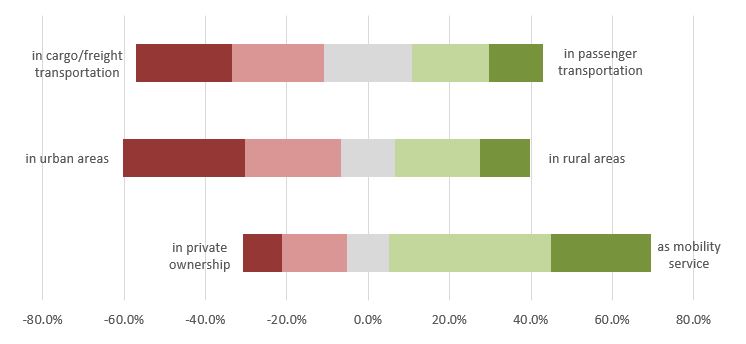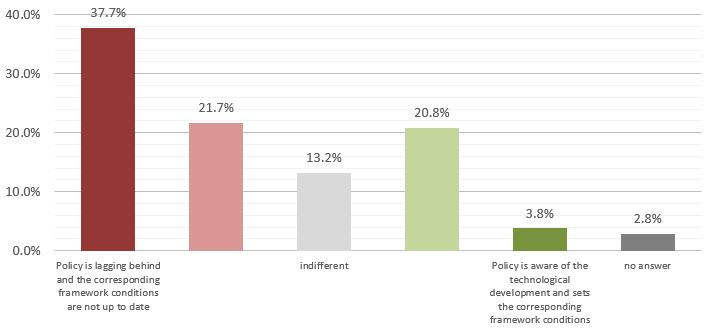In the course of the ongoing work for the INTEND project – which aims to identify future transport research needs and priorities – an online survey was conducted to validate hypotheses on the evolutionary development of the transport system. The survey addressed in particular transport related representatives from the academia, industry and policy sector and focused on the following main topics:
- innovations in transport technologies and their impact on the transport system
- the changing transport market
- the sustainability of the transport system
- the role of the policy with regard to emerging technologies and sustainability
Results show, that autonomous vehicle systems are expected to have rather positive than negative impacts on the transport system in the future, for instance due to more efficient traffic flows and better capacity utilization. However, large-scale implementations of autonomous driving systems are expected to be implemented first in cargo/freight than in passenger transportation and probably also in urban rather than in rural areas. With regard to passenger transportation, there is a strong tendency visible, that autonomous vehicle systems will be in use rather as mobility service than in private ownership. However, it remains unclear what effects autonomous driving systems will have on the spatial development and whether they will reinforce a decentralised spatial development in the future or not. In the field of UAV technology, it is expected that drones will be used more likely in cargo/freight transportation than in passenger transportation in the future. Participants’ assessment on the deployment of autonomous vehicle systems in different cases and applications (Data: ZHAW / n=106)
Participants’ assessment on the deployment of autonomous vehicle systems in different cases and applications (Data: ZHAW / n=106)
Regarding future changes in the transport market, there is a significant tendency visible, that private car ownership will decrease in the future due to newly emerging mobility products and services. This assessment also coincides with the experts’ expectation that the competitor’s landscape in the transport market will change in the future because of new players entering the market and challenging traditional mobility providers. In addition, the sharing of mobility rides is expected to have a high potential in the future whereas revolutionary transport concepts such as the Hyperloop One are not expected for being implemented on a large-scale. An integration into the transport system is therefore rather likely on heavily frequented routes in the medium-distance segment.
Regarding the impact of technological innovations on the sustainability of the transport system, there is a strong tendency visible that the increasing electrification of drivetrains could have positive impacts on the sustainability. However, the negative impacts resulting from the battery production are generally seen as less relevant within this context. In addition, there is a significant tendency visible, that lightweight construction could have a positive impact on the sustainability, for instance due to synergies with electric mobility.

Participants’ assessment on the attitude of the policy against innovations (Data: ZHAW / n=106)
Ultimately, survey results show that – with regard to newly emerging technologies – the policy is lagging behind and the regulatory framework conditions are not up to date at the moment. In addition, internalisation of negative external effects are expected to be crucial in the future, in order to achieve sustainability within transport (in contrast to a free market economy, which is expected to fail in this context).
The results of the online survey, as well as the findings of the initial desk research and the following expert interviews will be synthesized in a final work step, in order to draw a sketch of the future transport system, the main outcome in the first out of two deliverables for which the ZHAW is responsible within the INTEND project. This sketch will further on provide the basis to illustrate and understand the research needs, priorities and opportunities coming up with the transformation of the transport system – the main task in our second deliverable.
For more information about INTEND, visit the project Homepage or follow the latest news on Twitter, Facebook or LinkedIn.